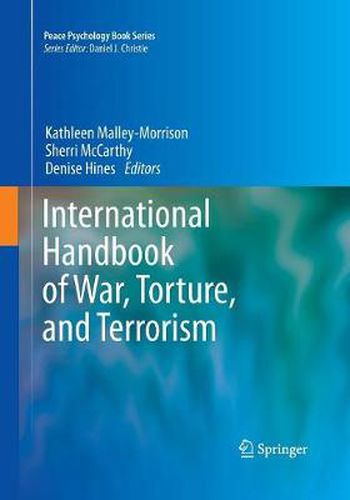Readings Newsletter
Become a Readings Member to make your shopping experience even easier.
Sign in or sign up for free!
You’re not far away from qualifying for FREE standard shipping within Australia
You’ve qualified for FREE standard shipping within Australia
The cart is loading…






This title is printed to order. This book may have been self-published. If so, we cannot guarantee the quality of the content. In the main most books will have gone through the editing process however some may not. We therefore suggest that you be aware of this before ordering this book. If in doubt check either the author or publisher’s details as we are unable to accept any returns unless they are faulty. Please contact us if you have any questions.
Armed conflict, on domestic or foreign soil, impacts people’s daily lives and shapes policy around the world. Millions live with the threat of terrorism, whether from random sources or known enemies. And the acceptability of torture is debated by politicians and public alike.
The International Handbook of War, Torture, and Terrorism synthesizes historical backgrounds, current trends, and findings from the Personal and Institutional Rights to Aggression and Peace Survey (PAIRTAPS), administered in forty countries over nine global regions. Contributors examine the social, cognitive, and emotional roots of people’s thinking on war and national security issues, particularly concerning the role of governments in declaring war, invading other countries, or torturing prisoners. By focusing on the cultural traditions and colonial histories of broad regions rather than of individual nations, the book demonstrates how context shapes ordinary citizens’ views on what is justifiable during times of war, as well as more nebulous concepts of patriotism and security. The Handbook:
Introduces the PAIRTAPS and explains the methodology for analyzing responses. Defines war-related concepts from the unique perspectives of Western Europe, U.K./U.S., Middle East, Gulf States, Russia/Balkans, Africa, Latin America, South/Southeast Asia, and East Asia. Provides an integrative summary of definitions and points of view. Situates results in terms of social engagement/disengagement theory. Considers implications for peace and reconciliation.
As a reflection of the changing global landscape, the International Handbook of War, Torture, and Terrorism deserves to be read by a wide range of researchers in peace psychology, political science, sociology, and anthropology.
$9.00 standard shipping within Australia
FREE standard shipping within Australia for orders over $100.00
Express & International shipping calculated at checkout
This title is printed to order. This book may have been self-published. If so, we cannot guarantee the quality of the content. In the main most books will have gone through the editing process however some may not. We therefore suggest that you be aware of this before ordering this book. If in doubt check either the author or publisher’s details as we are unable to accept any returns unless they are faulty. Please contact us if you have any questions.
Armed conflict, on domestic or foreign soil, impacts people’s daily lives and shapes policy around the world. Millions live with the threat of terrorism, whether from random sources or known enemies. And the acceptability of torture is debated by politicians and public alike.
The International Handbook of War, Torture, and Terrorism synthesizes historical backgrounds, current trends, and findings from the Personal and Institutional Rights to Aggression and Peace Survey (PAIRTAPS), administered in forty countries over nine global regions. Contributors examine the social, cognitive, and emotional roots of people’s thinking on war and national security issues, particularly concerning the role of governments in declaring war, invading other countries, or torturing prisoners. By focusing on the cultural traditions and colonial histories of broad regions rather than of individual nations, the book demonstrates how context shapes ordinary citizens’ views on what is justifiable during times of war, as well as more nebulous concepts of patriotism and security. The Handbook:
Introduces the PAIRTAPS and explains the methodology for analyzing responses. Defines war-related concepts from the unique perspectives of Western Europe, U.K./U.S., Middle East, Gulf States, Russia/Balkans, Africa, Latin America, South/Southeast Asia, and East Asia. Provides an integrative summary of definitions and points of view. Situates results in terms of social engagement/disengagement theory. Considers implications for peace and reconciliation.
As a reflection of the changing global landscape, the International Handbook of War, Torture, and Terrorism deserves to be read by a wide range of researchers in peace psychology, political science, sociology, and anthropology.